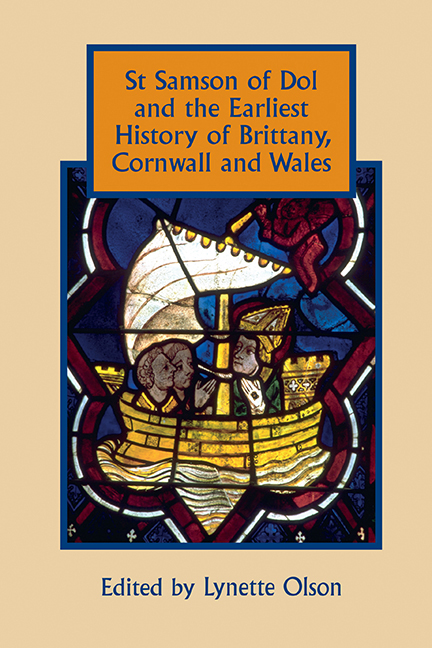Book contents
- Frontmatter
- Contents
- List of Tables
- Editor's Preface
- Map: Places associated with St Samson in the First Life
- 1 Introduction: ‘Getting Somewhere’ with the First Life of St Samson of Dol
- 2 A Family and its Saint in the Vita Prima Samsonis
- 3 La Circulation de l'information dans la Vie ancienne de s. Samson de Dol et la question de sa datation
- 4 The Hare and the Tortoise? Vita Prima Sancti Samsonis, Vita Paterni, and Merovingian Hagiography
- 5 Columbanus, the Britons, and the Merovingian Church
- 6 Apostolic Authority and Celtic Liturgies: from the Vita Samsonis to the Ratio de cursus
- 7 The Representation of Early British Monasticism and Peregrinatio in Vita Prima S. Samsonis
- 8 Present and Yet Absent: the Cult of St Samson of Dol in Wales
- Bibliography
- Index
- Studies in Celtic History
5 - Columbanus, the Britons, and the Merovingian Church
Published online by Cambridge University Press: 05 July 2018
- Frontmatter
- Contents
- List of Tables
- Editor's Preface
- Map: Places associated with St Samson in the First Life
- 1 Introduction: ‘Getting Somewhere’ with the First Life of St Samson of Dol
- 2 A Family and its Saint in the Vita Prima Samsonis
- 3 La Circulation de l'information dans la Vie ancienne de s. Samson de Dol et la question de sa datation
- 4 The Hare and the Tortoise? Vita Prima Sancti Samsonis, Vita Paterni, and Merovingian Hagiography
- 5 Columbanus, the Britons, and the Merovingian Church
- 6 Apostolic Authority and Celtic Liturgies: from the Vita Samsonis to the Ratio de cursus
- 7 The Representation of Early British Monasticism and Peregrinatio in Vita Prima S. Samsonis
- 8 Present and Yet Absent: the Cult of St Samson of Dol in Wales
- Bibliography
- Index
- Studies in Celtic History
Summary
The history of British saints on the Continent is notoriously difficult to research – and I deliberately use the word ‘British’ and ‘Briton’ even where others might prefer ‘Breton’, because for the sixth century it is usually impossible to make a definite distinction between those who originated in Great Britain and those who came from Brittany. The majority of our sources are late: the most substantial body of material is hagiographic, but the Vita Winwaloei was written by Wrdestin and Clement in the first years of the ninth century, that of Machutus (Malo) by Bili around 860, and that of Paul Aurelian by Wrmonoc in 884. Of the two Lives of Gildas, the earliest appears to belong to the eleventh century, and the second, by Caradoc of Llancarfan, to the twelfth. The first Life of Samson (VIS) would seem to have been composed initially during the seventh century, which is when the author himself claims to have been active, and there are certain linguistic and terminological features in the Life that support such a date. There may, of course, have been a subsequent moment of what French scholars are now describing as réécriture, but even so the fact that the text makes no mention of a diocese of Dol surely indicates that the work as we have it antedates the foundation of the see, whose existence is not clearly attested before the mid-ninth century.
For Samson, unlike Gildas, Paul Aurelian, Winwaloe (Gwennolé), and Malo, we at least have the evidence of the subscription list of the Council of Paris, which can be dated by means of the other signatories to the period 556 to 573. The Council provides us with a useful point of departure for considering the activities of British ascetics in the Merovingian world. Having considered the early evidence for Samson, I will turn to that relating to the Irish saint Columbanus, which arguably gives us our most extensive block of dateable evidence for the influence of Britons on the Continent, before returning to what the Vita Samsonis has to say about the saint's Continental career, and the ways in which it complements and differs from the Columbanian material.
- Type
- Chapter
- Information
- Publisher: Boydell & BrewerPrint publication year: 2018

